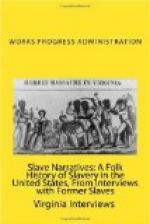“I married when I was a young man. I was lucky ‘nough to git de nex’ bes’ woman in de worl’. (Old Mis’ was de bes’.) Dat gal was so good ’til I had to court ‘er mos’ two years ’fore she’d say she’d have me.
“Us had six chillun. Three of ’em’s still livin’. I can’t say much for my chillun. I don’ lak to feel hard, but I tried to raise my chillun de bes’ I could. I educated ’em; even bought ’em a piano an’ give em’ music. One of ’em is in Memphis, ‘nother’n in Detroit, an’ de other’n in Chicago. I writes to ’em to he’p me, but don’ never hear from ’em. I’s old an’ dey is forgot me, I guess.
“Dat seems to be de way of de worl’ now. Ever’thing an’ ever’body is too fas’ an’ too frivoless[FN: frivilous] dese here times. I tell you, folks ought to be more lak old Marster was.
“I’s a Christian an’ loves de Lawd. I expects to go to him ’fore long. Den I know I’s gwine see my old Marstar an’ Mistis ag’in.”
BIBLIOGRAPHY
John Cameron: Jackson, Mississippi.
Mississippi Federal Writers Slave Autobiographies
[Gus Clark Howison, Mississippi]
Uncle Gus Clark and his aged wife live in a poverty-stricken deserted village about an eighth of a mile east of Howison.
Their old mill cabin, a relic of a forgotten lumber industry, is tumbling down. They received direct relief from the Era until May, 1934, when the Era changed the dole to work relief. Uncle Gus, determined to have a work card, worked on the road with the others until he broke down a few days later and was forced to accept direct relief. Now, neither Gus nor Liza is able to work, and the only help available for them is the meager State Old Age Assistance. Gus still manages to tend their tiny garden.
He gives his story:
“I’se gwine on ’bout eighty-five. ’At’s my age now. I was born at Richmond, Virginny, but lef’ dare right afte’ de War. Dey had done surrendered den, an’ my old marster doan have no mo’ power over us. We was all free an’ Boss turned us loose.
“My mammy’s name was Judy, an’ my pappy was Bob. Clark was de Boss’s name. I doan ‘member my mammy, but pappy was workin’ on de railroad afte’ freedom an’ got killed.
“A man come to Richmond an’ carried me an’ pappy an’ a lot of other niggers ter Loos’anna ter work in de sugar cane. I was little but he said I could be a water boy. It sho’ was a rough place. Dem niggers quar’l an’ fight an’ kills one ‘nother. Big Boss, he rich, an’ doan ’low no sheriff ter come on his place. He hol’ cou’t an’ settle all ’sputes hisself. He done bury de dead niggers an’ put de one what killed him back to work.
“A heap of big rattlesnakes lay in dem canebrakes, an’ dem niggers shoot dey heads off an’ eat ’em. It didn’ kill de niggers. Dem snakes was fat an’ tender, an’ fried jes lak chicken.




